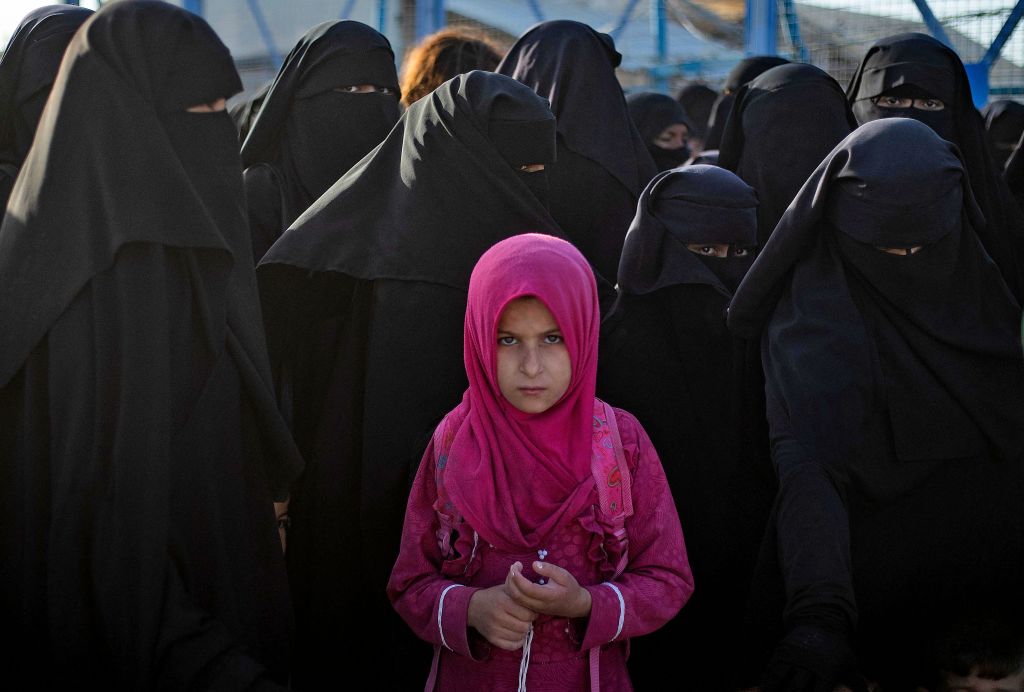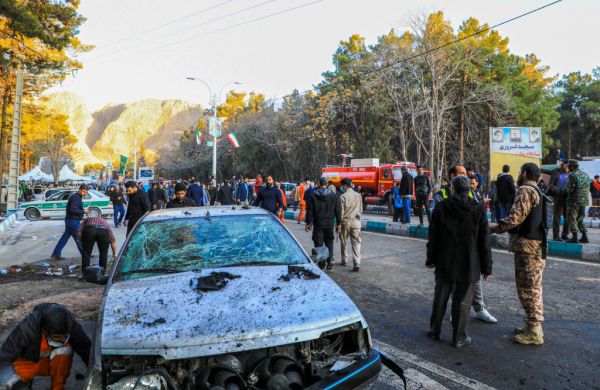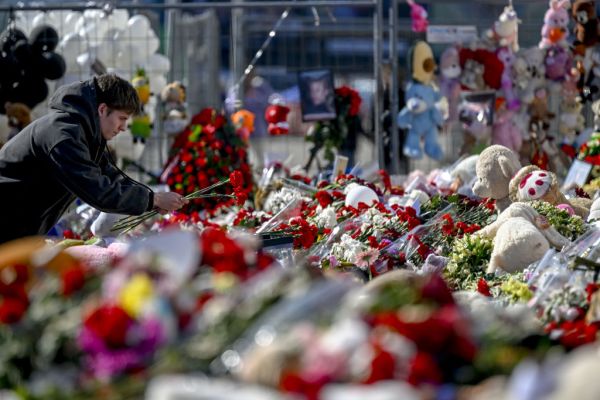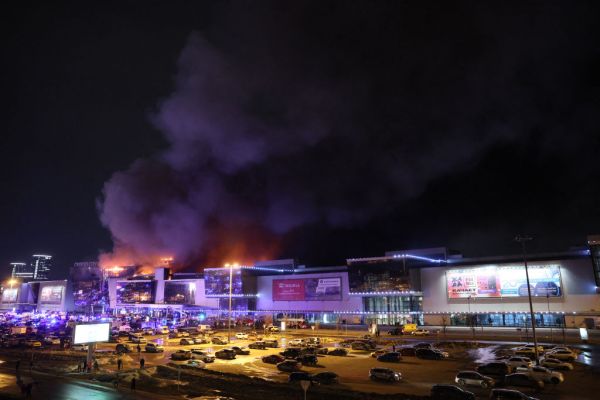Happy Wednesday! We’d like to congratulate New York City—long considered the center of art, culture, and innovation in this country—on discovering … trash bins.
Mayor Eric Adams unveiled the city’s official new receptacles this week, heralding “the next step forward in our ‘Trash Revolution.’”
Quick Hits: Today’s Top Stories
- Senate Democrats met on Capitol Hill on Tuesday for the first time since President Joe Biden’s June 27 debate performance, emerging without reaching a clear consensus whether they believe Biden should remain their party’s presidential nominee. Majority Whip Dick Durbin told reporters “it remains to be seen” if Biden should withdraw from the race, while former Speaker Nancy Pelosi demurred when asked if he’s the best person for the Democrats to put forward: “I’m not making any statement right now here in the hall. When I’m ready to make a statement, I will.” The Cook Political Report, an organization for non-partisan election analysis, updated its Electoral College ratings on Tuesday, shifting six states toward former President Donald Trump’s column, including Nevada, Arizona, and Georgia. Last night, Democratic Sen. Michael Bennet of Colorado became the first member of his caucus to publicly break with Biden, telling CNN he believes Trump is on track to win the election, and “maybe win it by a landslide,” costing Democrats control of both the House and Senate as well.
- The European Union (EU) ambassador to Georgia, Paweł Herczyński, said on Tuesday that European leaders had paused the Caucasus nation’s negotiations to join the 27-member bloc. The announcement follows the passage by Georgia’s ruling party of a Russian-styled “foreign agents” security law structured to squash civil society groups and independent media. The EU also froze $32.5 million in financial aid to Georgia’s defense ministry. “We will seek to redirect support from the government of Georgia to civil society and the media,” Herczyński said. “It is sad to see EU-Georgia relations at such a low point, when they could have been at an all-time high.”
- A Russian court on Tuesday announced an arrest warrant for Yulia Navalnaya, the widow of Russian opposition figure Alexei Navalny, who died under mysterious circumstances earlier this year in a Siberian penal colony. The order alleges that Navalnaya, who now lives in Germany, was a member of an “extremist organization”—and she could be arrested if she returns to her home country.
- CNN reported Tuesday that the U.S. military’s move to raise the alert level on some bases in Europe was based on intelligence revealing an ongoing and escalating Russian sabotage campaign. A series of arson and bomb plots originating from Russian nationals and their partisans have swept across the continent in recent months, with fires and explosions occurring in London, Paris, Prague, Warsaw, and Riga. “What we’re seeing now is a more concerted, more aggressive effort, than what we’ve seen certainly since the Cold War,” a U.S. military official told CNN. “We’re seeing sabotage, assassination plots, arson—real things that have cost human lives.”
- U.S. Director of National Intelligence Avril Haines said Tuesday that Iran has influenced and exploited some of the anti-Israel, pro-Palestinian protests in the U.S. in order to sow discord and undermine institutions. “In recent weeks, Iranian government actors have sought to opportunistically take advantage of ongoing protests regarding the war in Gaza, using a playbook we’ve seen other actors use over the years,” Haines wrote in a statement. “We have observed actors tied to Iran’s government posing as activists online, seeking to encourage protests, and even providing financial support to protesters.” She urged Americans—who likely don’t know they’re being targeted—to “remain vigilant” in online interactions.
- U.S. marshals assigned to protect the residences of Supreme Court justices shot a man on Friday as he allegedly attempted to carjack a marshal near Supreme Court Justice Sonia Sotomayor’s home in Washington, D.C., according to a police statement. The suspect allegedly pulled a pistol on one marshal while attempting the carjacking, and two marshals fired their weapons. The alleged carjacker was treated for non-life-threatening injuries.
- Former Republican Sen. Jim Inhofe of Oklahoma died on Tuesday at the age of 89 after suffering a stroke last week. Inhofe—who spent eight years in the House and nearly 30 years in the Senate but retired in 2023 due to his ill health—was a prominent defense hawk who served as the top Republican on the Senate Armed Services Committee from 2018 to 2021, and the chair of the Senate Environment Committee from 2003 to 2007 and 2015 to 2017. He was also the mayor of Tulsa, Oklahoma, from 1978 to 1984.
ISIS Detention Area a ‘Ticking Time Bomb’
In March 2019, a U.S.-backed coalition declared “mission accomplished” in the campaign to retake territory controlled by the Islamic State in Iraq and Syria (ISIS). Soon after, then-President Donald Trump withdrew American troops from northern Syria, marking the effective end of a high-profile battle to put down the brutal terrorist organization.
Though ISIS attacks and threats have made headlines again in recent months, the days of worrying about the would-be terrorist caliphate taking large swathes of territory in the Middle East are mostly over. But the story isn’t finished for the thousands of ISIS fighters, supporters, or their children living in prisons and detention camps in Syria.
Five years after the ISIS defeat, western nations and their Middle Eastern allies are divided over repatriating former ISIS fighters and their families—many of whom are or were citizens of Western democracies—to their native countries or leaving them in detention in dire living conditions, risking both further terror threats and the potential radicalization of a new generation.
Though ISIS lost its strongholds in Iraq and Syria, the terrorist organization that scarred the 2010s with international attacks still perpetuates violence in the region. Its affiliates are growing in Afghanistan and in sub-Saharan Africa, and the international threat is increasing once again. Islamic State Khorasan—or ISIS-K, the Afghan branch of the terrorist group—claimed responsibility for a deadly shooting in a Moscow concert hall in March that killed more than 100 people. Last month, gunmen carried out shootings targeting a synagogue, Orthodox churches, and police stations in two cities in Dagestan, a majority-Muslim region in southern Russia, that left 21 people dead. Although ISIS has not officially claimed responsibility for the attack, the Institute for the Study of War—a think tank that conducts open-source intelligence analysis—concluded that the group’s local affiliate was likely responsible. Meanwhile, eight Tajik nationals with connections to ISIS were arrested last month after crossing the U.S. southern border. The threat of an ISIS-K attack likewise looms over the upcoming Paris Olympics.
The group’s expanding international reach—and successful efforts at radicalization—have drawn attention back to the remnants of the 2010s caliphate. Approximately 9,000 ISIS fighters are currently being held in some two dozen detention facilities in Syria, run by the Syrian Democratic Forces (SDF)—a U.S.-backed Kurdish militia that was the primary ground force in the key battles of Raqqa and Baghouz that largely curtailed ISIS.
An additional 44,000 people affiliated with the terror group—more than 90 percent of whom are women and children—remain in detention, nearly all located within the Al-Hol camp in northeastern Syria. The camp was originally set up for refugees during the first Gulf War and is now full of those displaced from the caliphate, a mix of ISIS sympathizers and victims of ISIS persecution, the latter including members of the Yazidi ethnic and religious minority targeted in a genocide by the terrorist group between 2014 to 2017.
Some 10,000 women and children in the camp are originally from outside of Iraq and Syria, part of a phenomenon that saw people—often radicalized online—leave their homes in places like Texas, Sweden, or Malaysia to join the caliphate, as fighters or brides or both. At the height of the ISIS caliphate, more than 50,000 people went to Syria and Iraq from some 80 countries around the world.
While SDF forces control the boundaries of Al-Hol, preventing people from leaving the camp, they do little to influence what goes on inside, allowing some of the residents to create an environment that resembles the former caliphate. Radical Islamists have taken over life inside parts of the camp, creating religious squads to enforce Sharia codes, meting out floggings, and even carrying out executions. Images and videos from within the camp show women—many of whom were or still are married to former ISIS fighters—in full burqas, with their entire bodies covered in opaque cloth.
The security situation in the camp is dire. A United Nations (U.N.) human rights official visited Al-Hol last summer and found that “insecurity pervades daily life in the camp, and incidents of violence including murder, physical harm, intimidation, and sexual assault occur with some regularity, with no investigation or measures in place to prevent reoccurrence.” An April examination by human rights advocacy group Amnesty International—based on interviews with camp residents—alleged rampant sexual violence in Al-Hol and torture in other SDF detention centers, though the SDF denies those claims. A separate investigation by Save the Children revealed more than 100 alleged murders in Al-Hol between 2019 and 2022.
Counterterrorism analysts fear that the poor humanitarian conditions in the detention centers and camps create prime conditions for radicalization, offering a resurgent ISIS potential recruiting ground. “The Red Cross called [the conditions] ‘apocalyptic,’” Colin Clarke, director of research at the Soufan Group, said of the camp. “There’s few opportunities for education, and people are being taught to continue worshiping the Islamic State. That ideology is still alive and well in these camps.”
There are also reports that young boys are regularly smuggled out of Al-Hol to join ISIS training camps. CNN reported last month that, in a tragic attempt by the SDF to forestall radicalization, some children who were brought to Syria and Iraq by their parents or who were born and came of age there have since been detained in a maximum security prison for ISIS fighters, or otherwise sent to SDF-run “rehabilitation” centers. There is, however, no legal process justifying their detention.
Gen. Michael E. Kurilla—the head of U.S. Central Command, which controls U.S. military operations in the Middle East—has described Al-Hol as a “ticking time bomb.” He testified to the Senate Armed Services Committee last year that the children in the camps “are prime targets for ISIS radicalization,” warning that “they are at risk of becoming casualties to an ideological war within the camps: ISIS leaders want their minds.”
Kurilla argued that, unlike the original campaign against ISIS, there is “no military solution” to this crisis. “Our long-term goal must be the successful repatriation, rehabilitation, and reintegration of the camp residents back into their country of origin,” he said.
Since 2019, the U.S. has pushed countries to repatriate fighters, ISIS-affiliated camp residents, and displaced victims alike—considering such a move the only way to clear out the crowded and dangerous camps. But it’s a legally complicated, potentially dangerous, and politically thorny proposition that has sparked deep controversy in Western countries.
The United Kingdom, for example, has been particularly averse to repatriation. In one emblematic case, the U.K. stripped Shamima Begum—who was born in the U.K. but left at 15 to join ISIS —of her citizenship. “I’m not putting at risk British people’s lives to go looking for terrorists or former terrorists in a failed state,” then-Defense Minister Ben Wallace said in 2019 after Begum said she wanted to return to the U.K. “Actions have consequences.”
The difficulty of the task is clear from the relatively small number of repatriations in the four years after the caliphate fell. Fewer than 10,000 people— 6,500 Iraqis and some 2,700 so-called “third-country nationals” from outside Iraq and Syria—were repatriated between 2019 and the summer of 2023, according to the International Centre for Counter-Terrorism (ICCT), a Netherlands-based think tank.
Roughly 300 Americans had gone to Iraq and Syria to join ISIS as of 2018, just before the fall of the caliphate. Similarly, 260 Dutch citizens fought for the Islamic State. The U.K., by contrast, saw 850 British jihadis join the caliphate. It’s unclear how many of them are still alive and in the camps, and repatriations have been scant, with just 21 returned to the U.K. The U.S.—leading the repatriation charge—has returned roughly 50, including 11 who were repatriated in May. The Netherlands has brought back 66 Dutch fighters.
What happens to these one-time terrorists once they get back to their countries of origin? Prosecutions and jail sentences are common. Between 2019 and 2023, 11 Americans who joined ISIS were repatriated, prosecuted, and convicted. For example, Warren Christopher Clarke—a Texas man who traveled to Syria and received military training from ISIS—was sentenced to 10 years in prison for his involvement with the organization. The State Department’s Bureau of Counterterrorism has, alongside the Department of Justice, assisted prosecutors both in the U.S. and in partner countries in obtaining more than 275 successful convictions.
“The U.S. plan seems to be well studied, well planned, but it might be slow,” Omar Mohammed, a senior research fellow at George Washington University’s program on extremism, told TMD. “It might take more time, but we have seen, for example, there were successful prosecutions, but others were also benefiting from rehabilitation and reintegration.”
The State Department believes that reintegration and rehabilitation will be “vital to ending ISIS’s cycles of violence,” according to a progress report from the end of last year. Mohimanul Alam Bhuiya, a former Columbia University student from Brooklyn who fled the Islamic State in 2014 just three months after joining the group, pleaded guilty to charges of aiding the terrorist organization and provided intelligence agencies and prosecutors with ISIS documents and other information about the organization. Federal prosecutors then recommended that Bhuiya be placed under supervised release rather than receiving prison time.
The U.S. also has taken steps to repatriate the children of American ISIS fighters, but their reintegration poses some unique security risks. “Intelligence services and law enforcement security agencies, they would argue that their bandwidth would be overstretched by having to monitor all these folks,” Clarke told TMD.
In the most recent resettlement of 11 Americans in May, five were the American children of an American ISIS bride and of an unrelated ISIS fighter who had pleaded guilty to his terrorist activities. The two sons of the male terrorist were to be raised by their grandparents in Minnesota.
Other countries are more resistant to taking in people who may have been radicalized while held in the camps, even if they were not complicit in terrorist activities. “Let’s say 10 French children who are now adults, but they grew up in a very radical environment in the camps,” Mohammed told TMD. “How should France deal with them? They might think about them as a flight risk.”
“Radicalized, they might commit crimes on the French soil as retaliation for [their detention in SDF camps],” he added. “So it’s really the problem of having waited that long, and now you are faced with a new problem.”
The question that countries now face is whether the near-term risk of repatriating individuals who could potentially pose a threat is safer than the Al-Hol camp. “Western policies have been incredibly short-sighted over the years,” Clarke said. “If you condemn people into these camps and you never bring them home, you’re essentially making them stateless, and you’re offering them no other opportunity but to become a citizen of one state and one state only—and that’s the Islamic State.”
Worth Your Time
- In his latest Washington Post column, George Will argued that the White House and the media’s handling of the crisis of confidence in Biden will further accelerate public distrust in our institutions. “The leakage of trustworthiness from American institutions began with the lies that enveloped Watergate and Vietnam,” he wrote. “It accelerated during the 2008 financial crisis, when cynicism (‘You never want a serious crisis to go to waste’) fueled the government’s indiscriminate and lawless response: The law restricted bailouts to financial institutions? Declare automobile manufacturers to be such. The leakage became a cataract during the pandemic because of the public health establishment’s plucked-from-the-ether edicts (about masks, social distancing, which political gatherings should be exempt from social distancing, etc.) and the sacrifice-the-children opportunism of the most powerful segment of organized labor (teachers unions). Now the world’s oldest political party and its media accomplices have effected a gigantic subtraction from trust: Leaders of the former lied about President Biden’s condition until, on June 27, continuing to do so became untenable. The latter had allowed the lying because they believe Donald Trump’s many mendacities are an excuse for theirs.”
- For Plough magazine, Tara Isabella Burton faced her technology addiction head-on by severely limiting her tech use. “My new life, such as it is, is enabled by technology, even as it rejects its excesses,” she wrote. “I am grateful for my watch, my air fryer, even—book purists might be appalled—my Kindle, which can slip into a small purse more easily than a print book, and thus makes it more likely I will take the chance to read when out. But the technology I use is, increasingly, in the service of making possible—even in a city like New York—a life of smallness: a life where I can remain in touch with friends, go see theater, read books, write, cook simple meals for myself, and check what time the bus is leaving. The technology I retain access to, in other words, is technology that makes the good things possible—even as I am stricter than ever with myself about technology that does not.”
Presented Without Comment
CNN: [Nikki] Haley Says She is Releasing Her Convention Delegates and Urging Them to Support Trump
Also Presented Without Comment
Democratic Rep. Dean Phillips of Minnesota, who challenged President Joe Biden for the presidential nomination:
“If this is vindication, vindication has never been so unfulfilling.”
Also Also Presented Without Comment
Slovakian Prime Minister Robert Fico, who sustained four gunshot wounds in a May assassination attempt, returned to work yesterday, writing the following on his Facebook page:
“Dear progressive liberal media and opposition, sorry to have survived, but I am back.”
In the Zeitgeist
Pour one out for (Declan, and also) Cubs reliever Colten Brewer, who landed himself a spot on the 60-day injured list when he fractured his hand punching the wall of the dugout at Wrigley Field after a rough outing against the Angels on Saturday.
“I paced in the dugout a couple times and my frustration got the best of me,” Brewer said Sunday. “Just let a couple of punches into the wall. My intention wasn’t to break my hand.”

Toeing the Company Line
- In the newsletters: Nick decried (🔒) the cynicism of Democrats closing ranks around Biden, a candidate that most lawmakers plainly believe is “unfit for office.”
- On the podcasts: Sarah and Steve checked in on their High Steaks (🔒) bet again in light of Biden’s obstinance, and Jonah is joined on The Remnant by Daniel Hannan, a member of the British House of Lords, to discuss the recent U.K. elections.
- On the site today: Kevin reports from the National Conservatives conference on the learned helplessness of Sens. Mike Lee, Rick Scott, and Ron Johnson; Adam White analyzes the impact of the end of Chevron deference, and Jonah offers a reminder that Trump is neither loyal nor conservative.
Let Us Know
Should the U.S. government and other countries repatriate ISIS fighters?












Please note that we at The Dispatch hold ourselves, our work, and our commenters to a higher standard than other places on the internet. We welcome comments that foster genuine debate or discussion—including comments critical of us or our work—but responses that include ad hominem attacks on fellow Dispatch members or are intended to stoke fear and anger may be moderated.
With your membership, you only have the ability to comment on The Morning Dispatch articles. Consider upgrading to join the conversation everywhere.